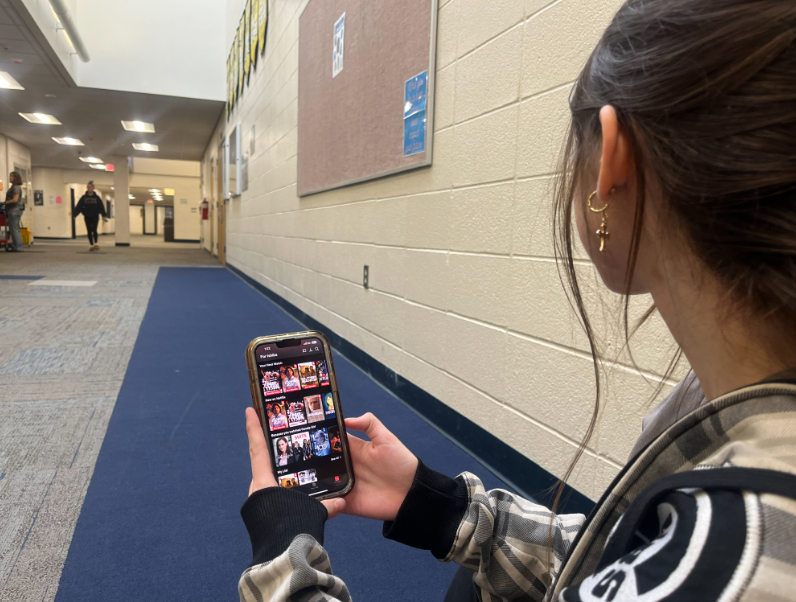In recent years, Netflix has seen continuous commercial growth due to the popularity of its original series. The streaming giant, however, has started to spiral away from success.
On May 16, Netflix released the third season of one of its most popular television series, “Bridgerton.” The release was highly anticipated due to the date being two years after the release of the previous season. Regardless of the long wait, Netflix split the season into two parts spanning over a month.
The drawn out release of the third season took away from the beauty of the series itself. Due to the long wait, fans of the show found themselves criticizing rather than appreciating the cinematography. “Splitting up the season took away from the experience of watching the show” stated junior Natalie Brown, “Having to wait to watch the next half of a show made me lose interest in the season.”
This obscure decision of release dates was not a one-time occurrence. Netflix later repeated this with popular shows like “Cobra Kai” and “Outer Banks,” with the former being released across three parts from late 2024 to early 2025.
Their decision to extend season releases was largely due to their hunt for retaining subscriptions. Fans of shows are likely to frequently add and cancel subscriptions based on the content available. Streaming services extend season releases across months to keep subscribers hooked. For Netflix, though, this tactic had an adverse effect, as the company began to lose subscribers.
Netflix lost subscribers and the respect of the platform’s viewers, “Not many people want to pay for Netflix for multiple months while waiting for the next seasons to come. It’s another way to capture more money from their viewers and it has made many of the platform’s users lose respect for the company,” said senior Jade Rupp.
Netflix’s regularity of splitting seasons is simply one part of its degradation as a reliable streaming service. Along with the mishandling of their release dates, Netflix has completely ruined the quality of viewable options on the platform.
Shows like “Anne with an E,” were canceled prematurely due to their perceived lack of popularity, despite “Anne with an E” holding a rating of 8.6 on IMDb. Furthermore, the show was critically acclaimed for its portrayal of heavy societal issues in the 19th century, such as racial discrimination and gender inequality.
While shows like “Anne with an E” were canceled, Netflix decided to support other streaming options like the “After” series, which has a 5.3 rating on IMDb and 18% on Rotten Tomatoes. Rather than educating the audience on vital social issues, the “After” series is an adaptation of a Harry Styles fanfiction novel.
Cinema is not simply an industry for entertainment, it is an industry to educate and advocate. What does it say about the industry’s direction if critically acclaimed content is being shut down?
Since Netflix lacks watchable content, viewers find themselves endlessly scrolling for quality content. “I often ask myself what I want to watch that day and find myself scrolling through the app watching almost an hour worth of trailers and still not finding anything that I wanna sit down and binge watch,” stated senior Ines Ruhara.
Along with platforming poor content, Netflix has also begun to produce substandard content. Netflix is home to original content like “He’s All That” and “Tall Girl” which have become internet sensations for all the wrong reasons.
Regardless of their lackluster content, Netflix continued to crank out similar content simply because they were popular.
Paired with the poor content, the platform enacted the new password-sharing policy to add to subscriber count. The Netflix account is limited to simply one household and any users outside of this house must pay an additional fee.
The password sharing policy derails the familial quality that Netflix used to offer. “My mom pays for Netflix for my family but my brother who lives in Iowa City and my sister at UNI aren’t able to use it because of the password sharing rule. It’s unfair because my mom pays for it for her kids, not just the two that live at home,” expressed Brown.
Netflix’s disregard for cinema and respect for viewers has led to the downfall of the once beloved platform. While the original platform was home to unique content and accessible streaming, the new landscape is unrecognizable.










Ava Hartsock • Dec 5, 2024 at 9:30 am
Choosing to prioritize profit is a logical for any company, but consumers catch on. These slow releases show subscribers that the company is not putting customer satisfaction first.